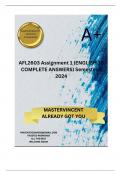,AFL2603 Assignment 1 (COMPLETE ANSWERS) Semester
2 2024 - DUE 2024 ; 100% TRUSTED Complete, trusted
solutions and explanations.
1.1 How did people in the olden days’ prior formal education,
transfer knowledge and skills to their children? Support your
answers with relevant examples. (15) 1.2 Folksongs and praise
poems are always regarded as old fashioned and outdated. Do
you agree or disagree with this statement? Support your answers
with relevant examples. (10) /25/
1.1 How did people in the olden days, prior to formal
education, transfer knowledge and skills to their children?
Support your answers with relevant examples. (15)
Knowledge and Skill Transfer in Pre-Formal Education
Era:
1. Oral Tradition:
o Storytelling: In many ancient cultures, oral
storytelling was a primary method of passing on
knowledge and skills. Elders and storytellers would
narrate tales that included moral lessons, historical
events, and practical skills. For example, in African
cultures, griots (oral historians) would pass down
histories, genealogies, and cultural practices through
storytelling.
o Proverbs and Sayings: Proverbs were used to convey
wisdom and social norms. They encapsulated practical
advice and ethical principles in a concise, memorable
, form. For example, the Zulu proverb "Umuntu
ngumuntu ngabantu" (A person is a person through
other people) emphasizes the importance of
community and relationships.
2. Apprenticeship and Mentorship:
o Skill Learning through Practice: Children learned
practical skills by working alongside adults in various
trades and crafts. For example, in traditional societies,
young people would learn farming techniques, animal
husbandry, and craftsmanship by assisting their
parents or elders.
o Mentorship in Art and Craft: In artisanal
communities, children would be mentored by skilled
artisans. For example, in medieval Europe, young
apprentices would learn the trade of blacksmithing or
carpentry from master craftsmen.
3. Rituals and Ceremonies:
o Cultural Practices: Rituals and ceremonies often
served as educational experiences where children
learned about cultural beliefs, roles, and
responsibilities. For instance, initiation rites in many
indigenous cultures were not only spiritual
experiences but also educational processes where
children learned the values and customs of their
community.
o Festivals and Celebrations: During festivals,
children observed and participated in traditional
practices, dances, and songs that conveyed historical
and cultural knowledge. For example, in Native
American tribes, powwows were occasions for sharing
stories and traditional dances.




